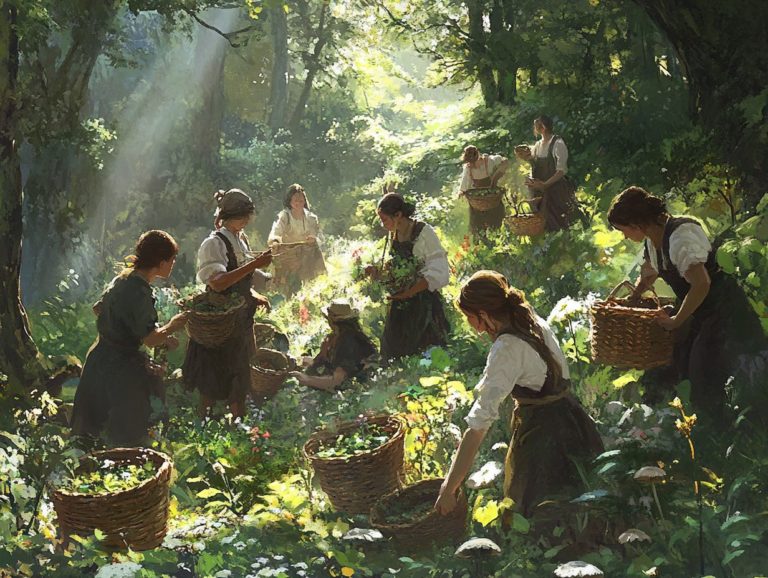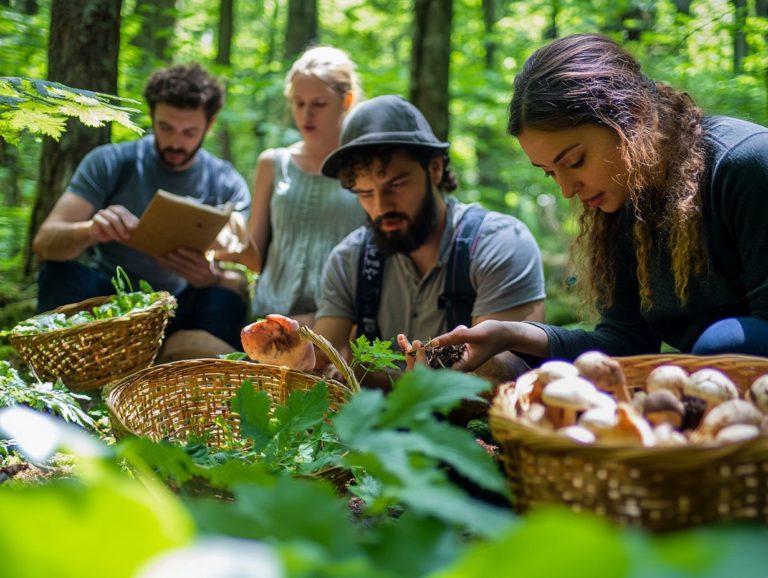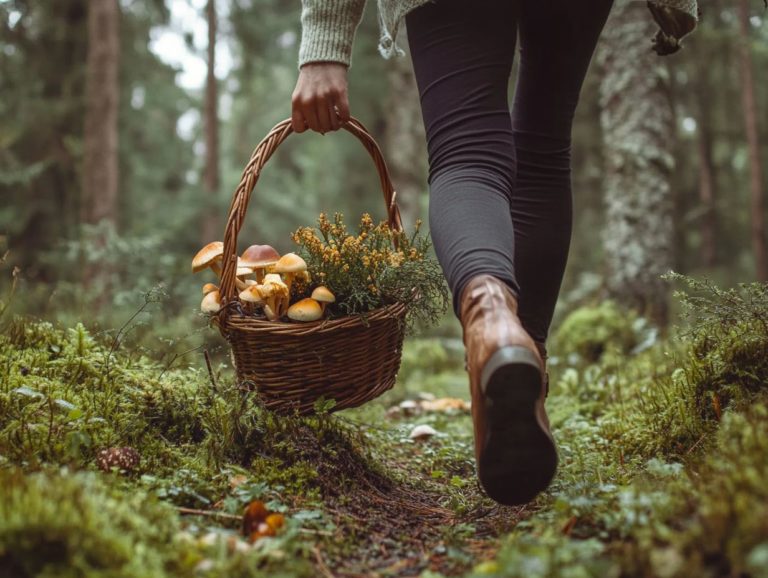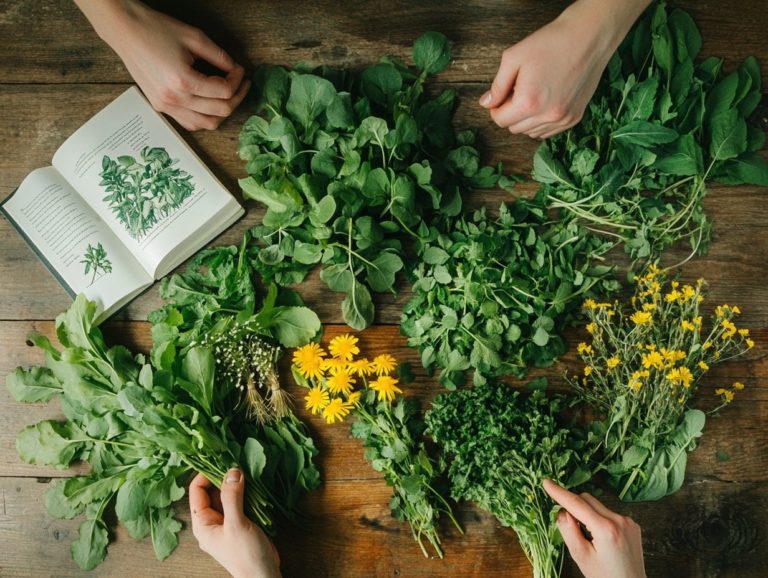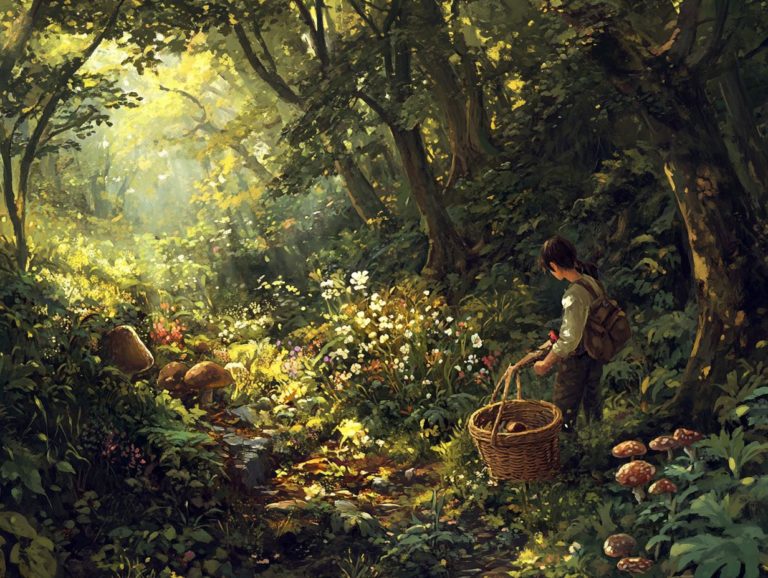The Importance of Ethical Foraging for Wild Plants
Dive into the world of ethical foraging! Connect with nature while supporting sustainability and protecting our environment.
This practice enhances your meals with nutritious and flavorful wild plants while also supporting conservation efforts. Delve into the key principles of ethical foraging, uncover its myriad benefits, and familiarize yourself with practical guidelines for responsible harvesting.
Whether you’re an experienced forager or just starting this journey, you can learn to relish the bounty of nature while safeguarding it for future generations.
Contents
- Key Takeaways:
- What is Ethical Foraging?
- Benefits of Ethical Foraging
- Ethical Guidelines for Foraging
- Commonly Foraged Wild Plants
- Alternative Sources for Wild Plants
- Frequently Asked Questions
- What is ethical foraging for wild plants?
- Why is ethical foraging important for wild plants?
- What are some examples of unethical foraging practices, including the risks associated with non-native plants?
- How can I practice ethical foraging for wild plants?
- What are the benefits of ethical foraging for wild plants, including foraging for medicinal plants and understanding plant species?
- What are some resources for learning about ethical foraging?
Key Takeaways:

- Ethical foraging is the responsible and sustainable practice of gathering and using wild plants for food and medicinal purposes.
- Practicing ethical foraging has numerous benefits, including promoting environmental sustainability and providing nutritional and culinary advantages.
- When foraging for wild plants, it’s important to follow ethical guidelines such as responsible harvesting methods and respecting private and public land.
What is Ethical Foraging?
Ethical foraging involves mindful gathering of wild foods, prioritizing sustainability and honoring the intricacies of natural ecosystems. It’s more than just picking edible plants and mushrooms like morel mushrooms and dandelion; it’s about cultivating a deep connection with nature, enriched by indigenous knowledge and cultural heritage, as highlighted in our guide on wild edibles: sustainable harvesting for future generations.
This thoughtful approach highlights the importance of field guides in foraging and a thorough understanding of local flora. This ensures that you forage with ethical principles that support environmental conservation and foster community involvement.
Defining the Practice
To define ethical foraging, you need to understand the principles of sustainable foraging and responsible wildcrafting, which prioritize ecological balance and community health.
This approach draws inspiration from ancient practices that emphasize respect for the land and the ecosystems that support diverse plant and animal life. Unlike traditional foraging, which may focus solely on harvesting, ethical foraging encourages a holistic perspective. You recognize the importance of maintaining habitat integrity and ensuring local communities benefit from natural resources.
By adopting sustainable harvesting techniques and committing to foraging ethics, you can make a meaningful impact. This protects biodiversity and enhances well-being within your community. Such shared responsibility cultivates a sense of stewardship toward nature, forging vital connections between people and the environment.
Benefits of Ethical Foraging
The benefits of ethical foraging extend beyond collecting food; they play a vital role in fostering environmental sustainability, enhancing nutritional health, and promoting food sovereignty within communities.
Engaging in this practice allows you to reconnect with nature and gain a deeper understanding of the ecological consequences of your choices. You ll also gain access to various wild foods such as elderberry and Oregon grape that aid your well-being and bolster resilience against the challenges posed by climate change.
Environmental Sustainability
At the heart of ethical foraging is environmental sustainability, guiding you toward practices that minimize the ecological impact of harvesting wild plants and mushrooms, as highlighted in the role of conservation in wild foraging.
By utilizing responsible harvesting techniques, you play a vital role in protecting biodiversity, ensuring that plant populations thrive for generations to come. For instance, through selective picking, you can harvest only a portion of a plant s yield, promoting regrowth and maintaining the balance of local ecosystems.
Engaging in conservation efforts like establishing designated foraging zones and adhering to local guidelines further enhances habitat protection. When you forage thoughtfully, you support your health by enjoying fresh, organic food while reinforcing the interconnectedness of all living organisms. This ultimately nurtures the ecosystems on which we all depend.
Join the movement of ethical foraging today! Every step you take helps preserve biodiversity and supports your local ecosystem. Are you ready to explore the wild and gather nature’s bounty?
Nutritional and Culinary Benefits
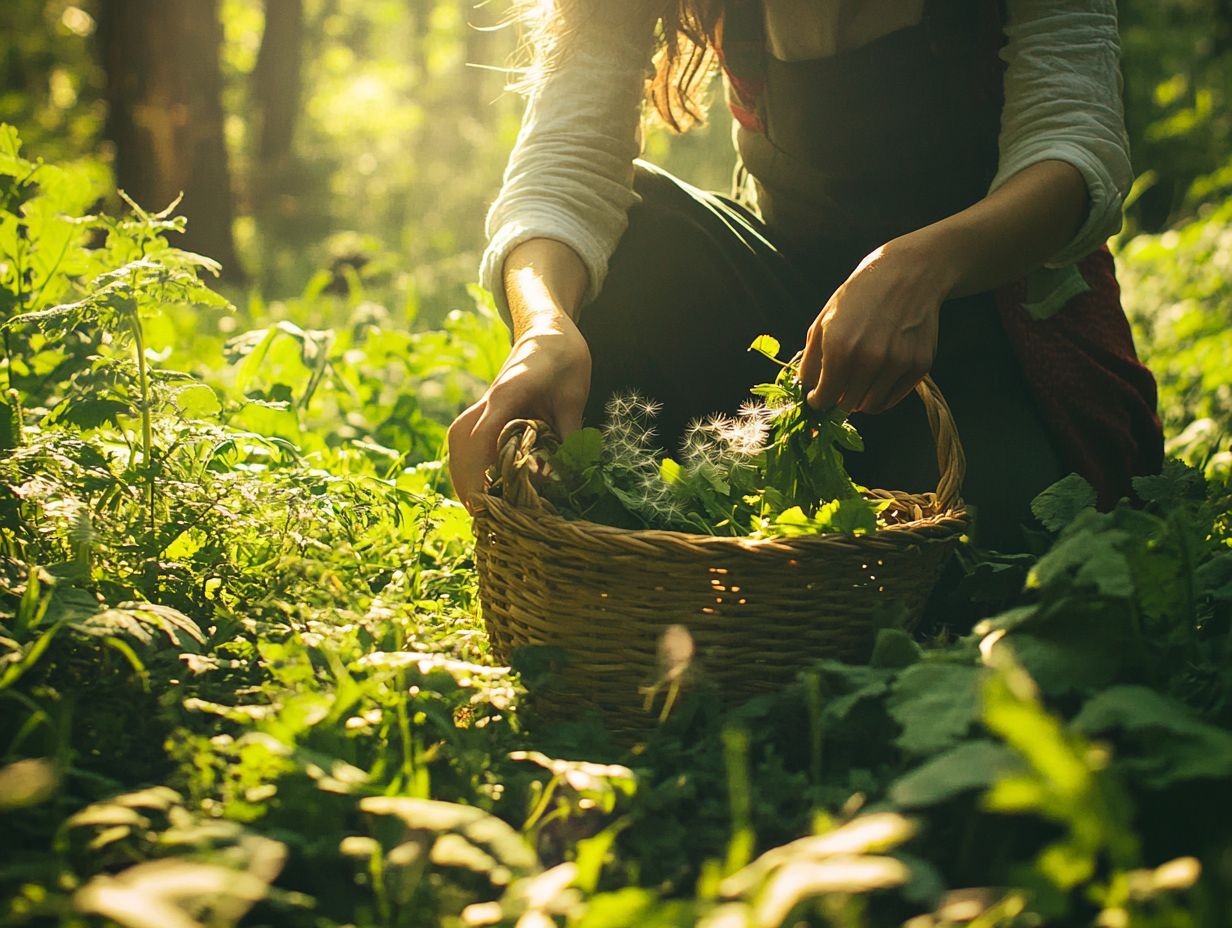
Ethical foraging offers amazing nutritional and culinary benefits. It allows you to access a diverse range of wild foods that often have higher nutritional value than cultivated ones. Keeping track of your findings through field notes in foraging can enhance your experience even further.
Foragers find that wild greens, berries, and mushrooms elevate flavors. Discovering these flavors can be a joyful experience, turning ordinary dishes into something special.
Young shoots of plants like dandelion provide impressive levels of vitamins A and C. Meanwhile, mushrooms such as chanterelles add a unique savory flavor along with beneficial compounds.
Specific parts of these plants, like roots and seeds, offer powerful medicinal options, enhancing your health and wellness. Incorporating these wild foods into your diet fosters a deeper connection with nature and brings numerous health benefits.
Ethical Guidelines for Foraging
Follow ethical guidelines when foraging. These guidelines ensure responsible harvesting practices that protect ecosystems and promote community education about sustainable foraging.
Understand local laws and regulations, including foraging permits. Show respect for both private and public lands to contribute to a sustainable relationship with nature and your community.
Responsible Harvesting Practices
Practicing responsible harvesting is key. This knowledge helps you identify edible plants and understand the specific harvesting guidelines for each species.
A comprehensive understanding cultivates a profound respect for nature. It also reduces the risk of harmful mistakes when distinguishing similar-looking plants.
Make sure you master plant identification techniques. Develop sharp observational skills to avoid dangerous look-alikes.
By adhering to sustainable harvesting criteria, you ensure these resources remain available for future generations. Continuous education through workshops or local foraging groups nurtures responsible practices, empowering you to forage safely and ethically.
Respecting Private and Public Land
Respect private and public land as part of ethical foraging. This commitment ensures adherence to established harvesting rules while fostering a spirit of reciprocity with nature.
Such respect sustains ecosystems and nurtures a sense of responsibility in those who gather from nature. Recognize that foraging intersects with cultural heritage, making it vital to understand the nuances of cultural appropriation.
Engaging in open dialogue with landowners and local indigenous communities promotes mutual understanding. By participating in these conversations, you gain insights into the significance of various plants and practices, contributing to collective stewardship.
Commonly Foraged Wild Plants
Commonly foraged wild plants are valuable for nutrition and medicine. They are invaluable resources for those seeking to enrich their diets through seasonal harvesting.
Mastering plant identification and recognizing the specific parts of edible plants like the leaves of dandelion or the roots of wild onion is essential for safe and sustainable foraging practices.
Identification and Preparation Tips
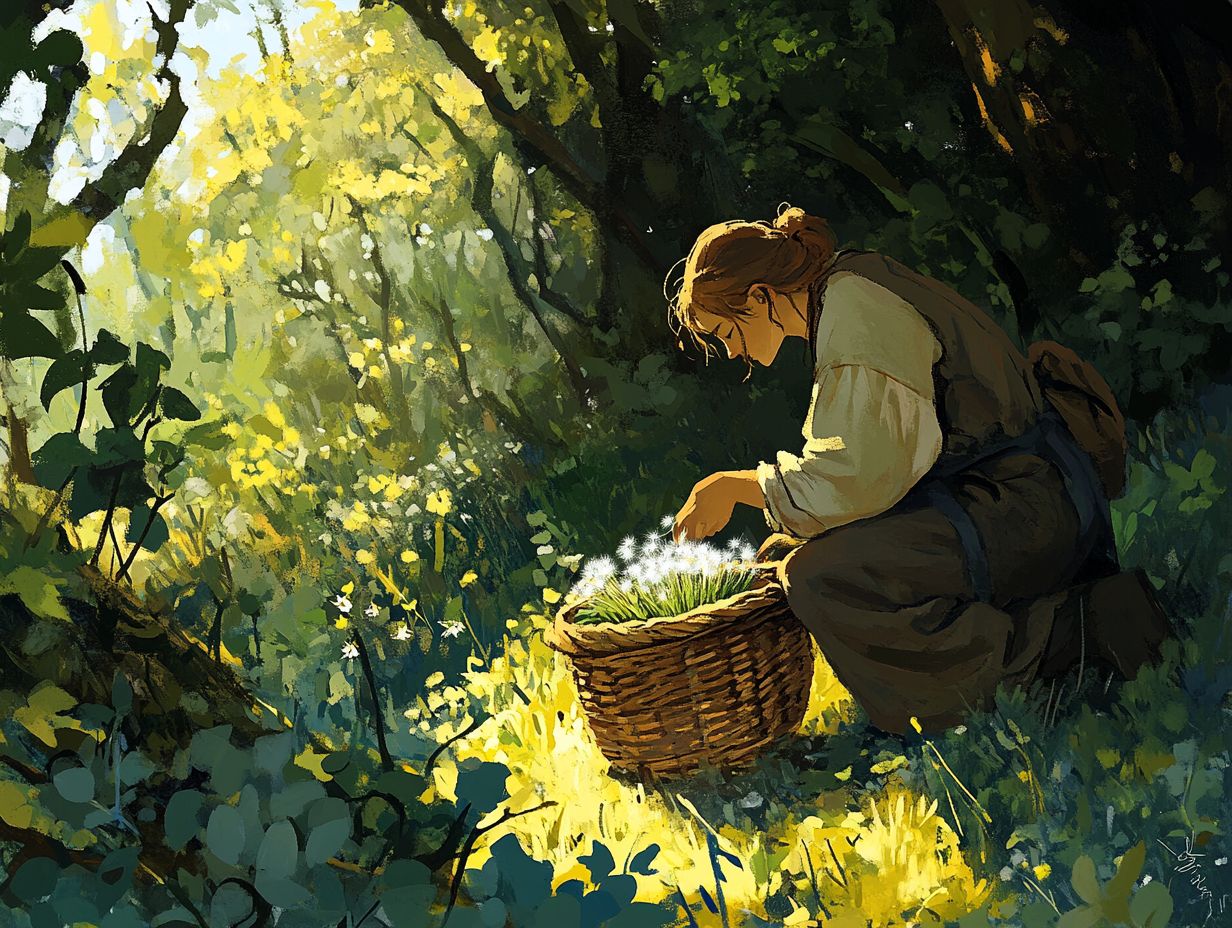
Identification and preparation tips are essential when foraging, as they empower you to safely distinguish between edible plants and their potentially toxic look-alikes.
Understanding how the plants look is paramount; for instance, the vibrant green of ramp leaves can easily be mistaken for similar-looking poisonous plants. Observing their habitat provides valuable clues as well wild leeks thrive in moist, shaded woodlands, while dandelions bask in sunny fields and gardens.
Once you’ve confidently identified the plants, use best practices for cooking these wild foods to enhance both flavor and safety. Steam or saut these plants to keep their nutrients and flavor intact!
Use proper preservation techniques like drying or freezing to ensure that you can savor these unique flavors long after the season has passed.
Alternative Sources for Wild Plants
Exploring alternative sources for wild plants opens a door to supporting local farmers and embracing sustainable agriculture, ultimately fostering community involvement and enhancing food sovereignty.
Engaging with local farmers’ markets and community gardens allows you to access sustainably sourced wild foods while immersing yourself in the essential principles of ethical foraging practices.
This journey enriches your palate and strengthens your connection to the community and the land.
Supporting Local Farmers and Sustainable Agriculture
Supporting local farmers and sustainable agriculture is essential for enhancing food sovereignty and ensuring access to nutritious, ethically sourced food resources.
These initiatives deepen your connection to the land while boosting local economies by keeping food dollars circulating within your community. Community-supported agriculture (CSA) is a program where you can buy fresh food directly from local farmers, reducing the environmental impact tied to long-distance transportation of goods.
By embracing ethical foraging principles, you can enrich your food sourcing practices further, respecting natural ecosystems and nurturing local biodiversity. Together, these approaches create a holistic food system that prioritizes sustainability, social justice, and community well-being, reinforcing the idea that where your food comes from truly matters.
Frequently Asked Questions
What is ethical foraging for wild plants?
Ethical foraging for wild plants refers to the practice of collecting and using plants responsibly and sustainably while respecting the environment and the rights of other foragers and landowners, which highlights the importance of wild edibles.
Why is ethical foraging important for wild plants?
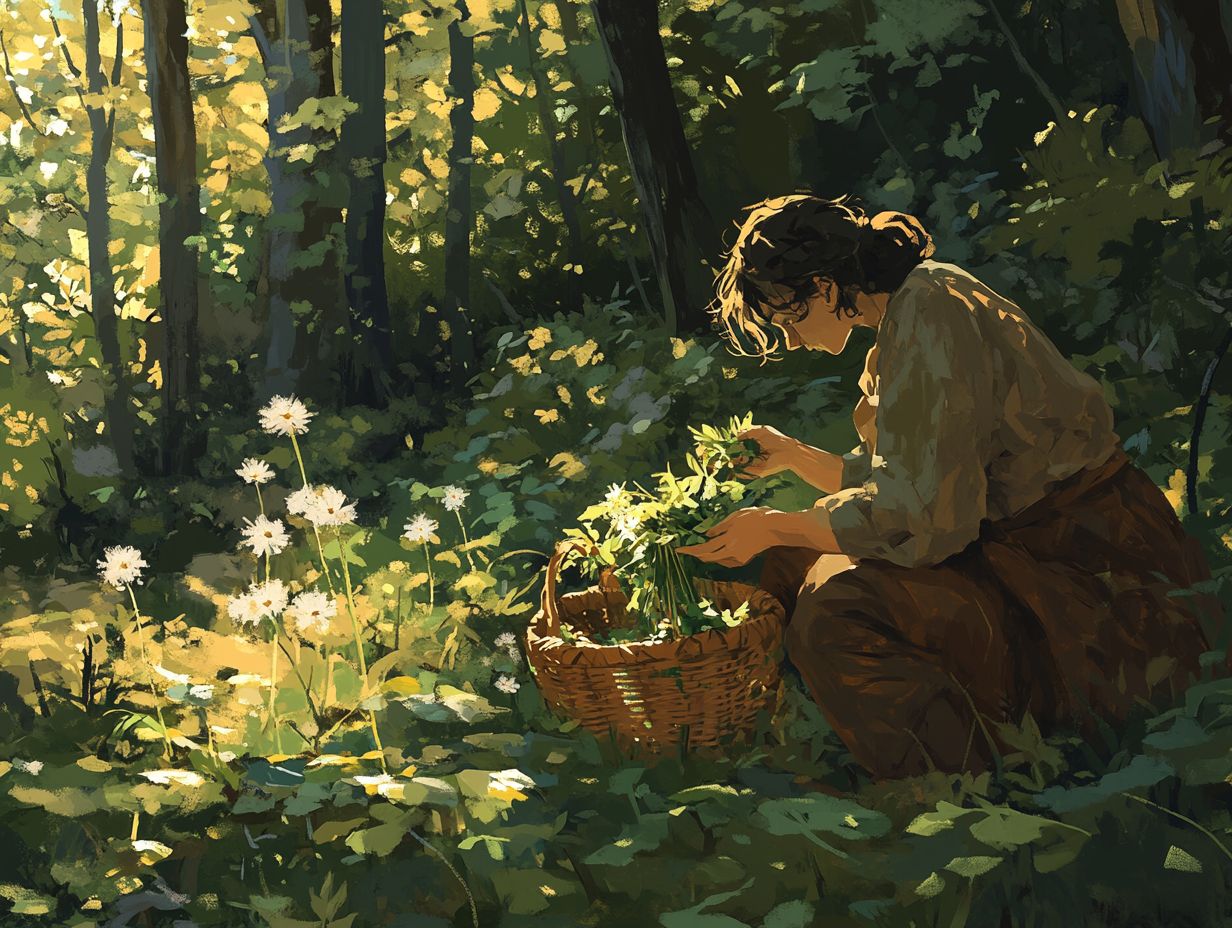
Ethical foraging is crucial for wild plants because it helps maintain the balance of ecosystems, preserves biodiversity, and ensures that future generations will also have access to these plants. For more information, you can explore ethical guidelines for foraging. It promotes a more respectful and mindful relationship with nature.
What are some examples of unethical foraging practices, including the risks associated with non-native plants?
Examples of unethical foraging practices include taking more than what is needed, harvesting rare or endangered plants, damaging the surrounding environment, and foraging on private property without permission.
How can I practice ethical foraging for wild plants?
You can practice ethical foraging by educating yourself about the plants you are collecting, only taking what you need, avoiding harvesting rare or endangered plants, and leaving the surrounding environment undisturbed. For more information, check out the top resources for sustainable foraging. Always ask for permission before foraging on private property.
What are the benefits of ethical foraging for wild plants, including foraging for medicinal plants and understanding plant species?
The benefits of ethical foraging for wild plants include promoting sustainable harvesting practices, protecting the environment and native species, and fostering a deeper connection with nature and the food we consume. To learn more, check out what you should know about foraging ethics.
What are some resources for learning about ethical foraging?
Many resources can help you dive into the world of ethical foraging for wild plants. These include books, online articles, videos, workshops, classes, and local foraging groups.
Always check that your resources are trustworthy! Ask experts if you’re unsure.


